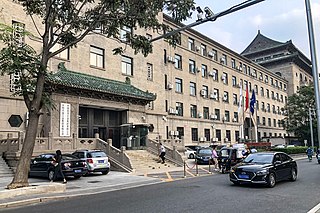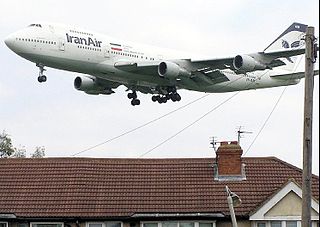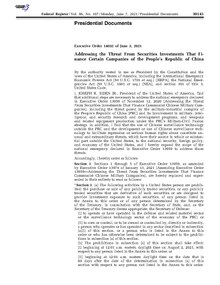
The Office of Foreign Assets Control (OFAC) is a financial intelligence and enforcement agency of the United States Treasury Department. It administers and enforces economic and trade sanctions in support of U.S. national security and foreign policy objectives. Under presidential national emergency powers, OFAC carries out its activities against foreign governments, organizations, and individuals deemed a threat to U.S. national security.

The relationship between the People's Republic of China (PRC) and the United States of America (USA) has been complex and at times tense since the establishment of the PRC and the retreat of the government of the Republic of China to Taiwan in 1949. Since the normalization of relations in the 1970s, the US–China relationship has been marked by numerous perennial disputes including the political status of Taiwan, territorial disputes in the South China Sea, and more recently the treatment of Uyghurs in Xinjiang. They have significant economic ties and are significantly intertwined, yet they also have a global hegemonic great power rivalry. As of 2025, China and the United States are the world's second-largest and largest economies by nominal GDP, as well as the largest and second-largest economies by GDP (PPP) respectively. Collectively, they account for 44.2% of the global nominal GDP, and 34.7% of global PPP-adjusted GDP.

China North Industries Group Corporation Limited, doing business internationally as Norinco Group, and known within China as China Ordnance Industries Group Corporation Limited, is a Chinese state-owned defense corporation that manufactures commercial and military products. Norinco Group is one of the world's largest defense contractors.
The Committee on Foreign Investment in the United States is an inter-agency committee in the United States government that reviews the national security implications of foreign investments in the U.S. economy.

United States sanctions are financial and trade restrictions imposed against individuals, entities, and jurisdictions whose actions contradict U.S. foreign policy or national security goals. Financial sanctions are primarily administered by the U.S. Department of the Treasury's Office of Foreign Assets Control (OFAC), while export controls are primarily administered by the U.S. Department of Commerce's Bureau of Industry and Security (BIS).

The International Emergency Economic Powers Act (IEEPA), Title II of Pub. L. 95–223, 91 Stat. 1626, enacted October 28, 1977, is a United States federal law authorizing the president to regulate international commerce after declaring a national emergency in response to any unusual and extraordinary threat to the United States which has its source in whole or substantial part outside the United States. The act was signed by President Jimmy Carter on December 28, 1977.

Following the Iranian Revolution, the United States has since 1979 applied various economic, trade, scientific and military sanctions against Iran. United States economic sanctions are administered by the Office of Foreign Assets Control (OFAC), an agency of the United States Department of the Treasury. As of 2017, United States sanctions against Iran include an embargo on dealings with the country by the United States, and a ban on selling aircraft and repair parts to Iranian aviation companies.

Myanmar (Burma) and the United States had a diplomatic contact prior to the British colonial period. They established formal diplomatic relations in 1947 in anticipation of Burma's independence.
There have been a number of international sanctions against Iran imposed by a number of countries, especially the United States, and international entities. Iran was the most sanctioned country in the world until it was surpassed by Russia, following Russia's invasion of neighboring Ukraine in February 2022.

Hangzhou Hikvision Digital Technology Co., Ltd., often shortened to Hikvision, is a Chinese partly state-owned manufacturer and supplier of video surveillance equipment for civilian and military purposes, headquartered in Hangzhou, Zhejiang. Due to its alleged involvement in mass surveillance of Uyghurs and the Xinjiang internment camps and national security concerns, the company has been placed under sanctions from the U.S. and European governments.
International sanctions have been imposed against Russia and Crimea during the Russo-Ukrainian War by a large number of countries, including the United States, Canada, the European Union, and international organisations following the Russian annexation of Crimea, which began in late February 2014. Belarus has also been sanctioned for its cooperation with and assistance to Russian armed forces. The sanctions were imposed against individuals, businesses, and officials from Russia and Ukraine. Russia responded with sanctions against several countries, including a total ban on food imports from Australia, Canada, Norway, Japan, the United States, the EU and the United Kingdom.

The Countering America's Adversaries Through Sanctions Act (CAATSA) is a United States federal law that imposed sanctions on Iran, North Korea, and Russia. The bill was passed by the Senate on July 27, 2017, 98–2, after it passed the House 419–3. It was signed into law on August 2, 2017, by President Donald Trump, who nevertheless believed that the legislation was "seriously flawed".
The United States government applies economic sanctions against certain institutions and key members of the government of the People's Republic of China and its ruling Chinese Communist Party (CCP), certain companies linked to the People's Liberation Army (PLA), and other affiliates that the U.S. government has accused of aiding in human rights abuses. The U.S. maintained embargoes against China from the inception of the People's Republic of China in 1949 until 1972. An embargo was reimposed by the U.S. following the 1989 Tiananmen Square protests and massacre. From 2020 onward, the U.S. imposed sanctions and visa restrictions against several Chinese government officials and companies, in response to the persecution of Uyghurs in China, human rights abuses in Hong Kong and Tibet, military-civil fusion, support for the Russian invasion of Ukraine, and fentanyl production.
The Entity List is a trade restriction list published by the United States Department of Commerce's Bureau of Industry and Security (BIS), consisting of certain foreign persons, entities, or governments. It is published as Supplement 4 of Part 744 of the Code of Federal Regulations. Entities on the Entity List are subject to U.S. license requirements for the export or transfer of specified items, such as some U.S. technologies. However, U.S. persons or companies are not prohibited from purchasing items from a company on the Entity List. Being included on the Entity List is less severe than being designated a "denied person" and more severe than being placed on the Unverified List (UVL).
The Clean Network is a U.S. government-led, bi-partisan effort announced by then U.S. Secretary of State Mike Pompeo in August 2020 to address what it describes as "the long-term threat to data privacy, security, human rights and principled collaboration posed to the free world from authoritarian malign actors." Its promoters state that it has resulted in an "alliance of democracies and companies," "based on democratic values." According to the Trump administration, the Clean Network is intended to implement internationally accepted digital trust standards across a coalition of trusted partners.
Executive Order 13959 is a U.S. Presidential Executive Order signed on November 12, 2020, by President Donald Trump. Its title, and stated goal, is "Addressing the Threat From Securities Investments That Finance Communist Chinese Military Companies."
In 2020, the United States government announced that it was considering banning the Chinese social media platform TikTok upon a request from Donald Trump, the president of the United States, who viewed the app as a national security threat. The result was that the parent company of TikTok, ByteDance—which initially planned on selling a small portion of TikTok to an American company—agreed to divest TikTok to prevent a ban in the United States and in other countries where restrictions are also being considered due to privacy concerns, which themselves are mostly related to its ownership by a firm based in China.

The United States has supported Ukraine during the ongoing Russian invasion of Ukraine. After it began on 24 February 2022, President Joe Biden condemned the invasion, provided military, financial and humanitarian aid to Ukraine, and imposed sanctions against Russia and Belarus.










